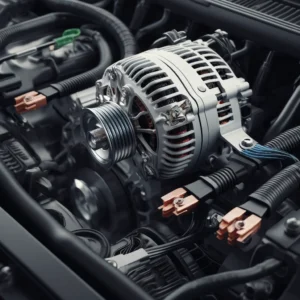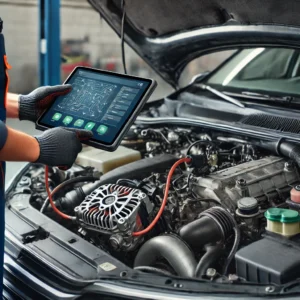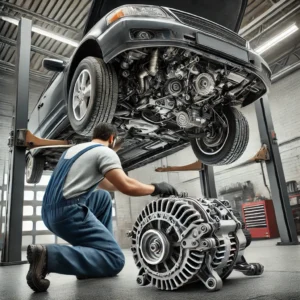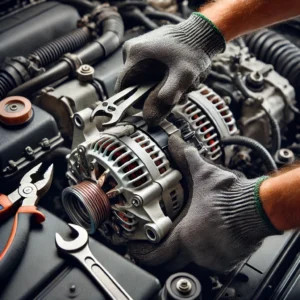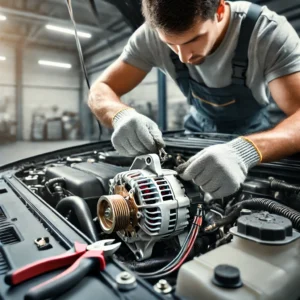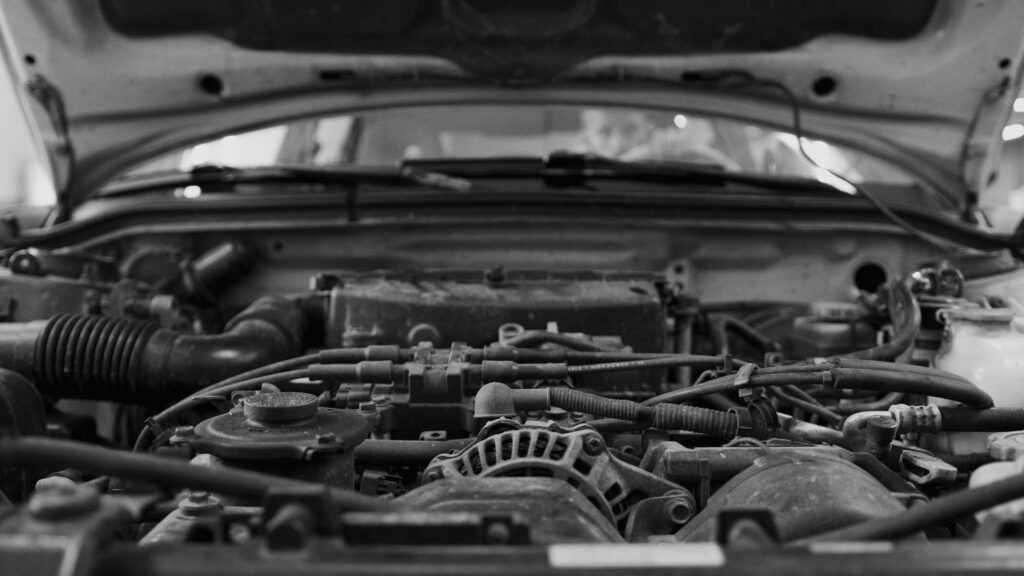
Alternator Replacement in Cars: A Comprehensive Guide
The alternator is a key component of your car’s electrical system. Its primary function is to convert mechanical energy from the engine into electrical energy, which powers your vehicle’s electrical systems and keeps the battery charged while the engine runs. Essentially, the alternator ensures that everything from your headlights to your radio works properly when you’re on the road.
When Should You Consider an Alternator Replacement?
Over time, alternators can wear out or fail for various reasons:
Most alternators last between 7 to 10 years, depending on driving conditions and how well they’ve been maintained.
Bearings and internal components can deteriorate, leading to decreased performance.
Voltage spikes or faulty wiring can damage the alternator.
Rust and corrosion on electrical connections can interfere with the alternator’s function.
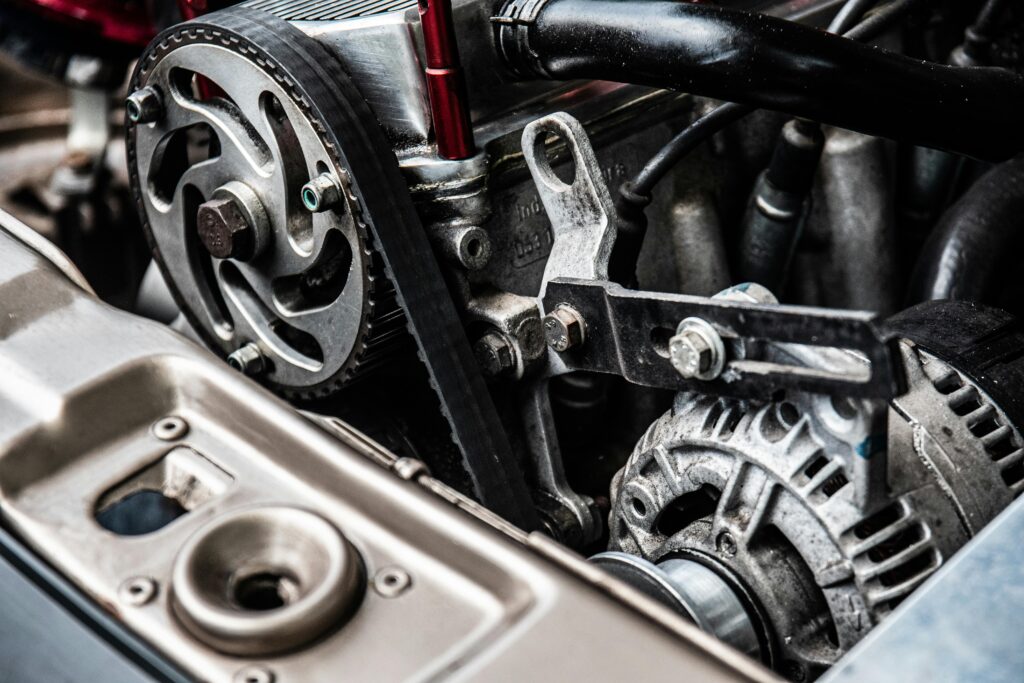

Signs of a Failing Alternator
Look out for these common symptoms that may indicate you need an alternator replacement:
– Dimming Lights: If your headlights or dashboard lights appear dim, it might be a sign that the alternator isn’t generating enough power.
– Warning Lights: A battery or alternator warning light on your dashboard could signal a problem.
– Starting Issues: If your car struggles to start or has a weak crank, the alternator may not be charging the battery adequately.
– Strange Noises: Unusual sounds, such as whining or grinding from the engine area, could indicate a failing alternator.
Find the Perfect Fit for Your Budget
Choose from our range of flexible pricing options that cater to your specific needs.
Frequently Asked Questions
Find answers to commonly asked questions about our products and services.
What is the function of an alternator in a vehicle?
The function of an alternator in a vehicle is to generate electrical energy to power the cars electrical systems and recharge the battery while the engine is running. It converts mechanical energy from the engine into electrical energy through electromagnetic induction. This ensures that essential components like lights, radio, and dashboard instruments operate efficiently while driving.
What does the process of replacing an alternator entail?
The process of replacing an alternator generally starts with disconnecting the battery to prevent any electrical shorts. Then, the technician will typically remove the serpentine belt that drives the alternator. Afterward, they may need to disconnect electrical connectors and remove any brackets or components obstructing access to the alternator. The old alternator is then unbolted and taken out, and the new alternator is installed in its place
How long does shipping take?
Shipping times vary depending on your location. Typically, orders are processed within 1-2 business days, and delivery can take anywhere from 3-10 business days. You will receive a tracking number once your order has been shipped.
Is it possible to replace an alternator on my own?
Yes, you can replace an alternator yourself if you have basic mechanical skills and the right tools. The process involves disconnecting the battery, removing the serpentine belt, and unbolting the old alternator. If you are unsure about your abilities, it’s advisable to consult a professional mechanic for assistance.
What are the signs that indicate a failing alternator?
Signs of a failing alternator include dim or flickering headlights, which can be accompanied by issues with other electrical components like the radio and power windows. You may also see warning lights on the dashboard, particularly the battery light, indicating a problem with the charging system.
How much time does it typically take for a mechanic to replace an alternator?
Replacing an alternator typically takes a mechanic between one to three hours, depending on the vehicles make and model. Some cars have easier access to the alternator, while others may require more time due to tight spaces or additional components that need removal. After the replacement, the mechanic will usually perform tests to ensure everything is functioning correctly, which can add some extra time. Overall, the process is relatively straightforward but can vary based on specific vehicle conditions.
How frequently should an alternator be replaced?
You should consider replacing your alternator if it shows signs of wear, such as dimming headlights or electrical malfunctions, typically around 80,000 to 150,000 miles. Regular inspections during maintenance can help catch potential issues early. If you experience symptoms of failure, it is wise to have it checked immediately to avoid battery problems.
What are the indicators of a failing alternator?
Indicators of a failing alternator include dim or flickering headlights, dashboard warning lights (particularly the battery light), and electrical system malfunctions, such as issues with power windows or the radio. You may also experience difficulty starting the vehicle, a dead battery that won’t hold a charge, or unusual noises like grinding or whining from the engine bay. If you notice any of these signs, it’s important to have the alternator inspected promptly.
What can I do to make my alternator last longer?
To help your alternator last longer, make sure your battery is in good shape because a weak battery can make the alternator work harder. Check the connections for rust or dirt to ensure electricity flows well. Avoid adding too many electrical accessories that could overload the system, and keep the serpentine belt in good condition. Lastly, keep the alternator clean and free of dirt to prevent overheating
Is it safe to drive with a faulty alternator?
Driving with a bad alternator is not advisable. While you may be able to drive short distances, a failing alternator can lead to a dead battery, causing your vehicle to stall or not start at all. Electrical systems, like lights and power steering, may also malfunction, making it difficult to control the vehicle.
Is it recommended to replace the battery alongside the alternator?
While not required, it’s advisable to consider replacing the battery when replacing the alternator. If the battery is old or weak, a new alternator may strain it, leading to further issues. Replacing both can improve your vehicles reliability. Always consult a mechanic to assess the batterys condition
What is the typical lifespan of a battery when the alternator is not working properly?
When the alternator is not functioning properly, a battery may last just a few hours or up to a couple of days at most, depending on its condition and the electrical demands placed on it. The battery will drain quickly since the alternator isn’t recharging it, and you may experience difficulty starting the vehicle or notice electrical system malfunctions. It’s important to address alternator issues promptly to avoid being stranded with a dead battery.
What are the signs that indicate a failing ABS module in a vehicle?
A failing ABS module can trigger several symptoms, including the illumination of the ABS warning light on the dashboard and brakes locking up during sudden stops, particularly on slippery surfaces. You may also notice a pulsating brake pedal, extended stopping distances, and unusual noises when braking. If these issues arise, it’s essential to have your vehicle inspected by a qualified mechanic.
Can a malfunctioning alternator result in failing the MOT test?
No, a car will not fail its MOT on an alternator issue itself. The alternator is not checked as part of the MOT, but a garage may flag it as something to address outside of an MOT to help ensure your vehicle will be able to charge its battery as intended.
Can a bad or faulty alternator affect a new battery?
Yes, a malfunctioning alternator can cause a vehicle to fail its MOT if it affects essential electrical systems like lights and indicators. If the alternator fails to charge the battery properly, it may result in warning lights illuminating, leading to a potential MOT failure.
Is it possible for a car to operate without an alternator?
A car can run without an alternator for a short period, relying solely on the battery for power. However, once the battery is depleted, the car will stall and will not restart until the alternator is repaired or replaced.
Is it possible for an alternator to fail unexpectedly?
Yes, an alternator can fail unexpectedly, often due to wear and tear, electrical faults, or damage from heat or corrosion. Sudden failure may manifest through signs like a dead battery, dimming headlights, or warning lights on the dashboard. Additionally, factors such as a broken belt or loose connections can contribute to abrupt alternator failure.
What steps can I take to determine if my cars alternator is functioning correctly?
To check if your cars alternator is working properly, start by inspecting the dashboard for any warning lights. Then, use a multimeter to measure the battery voltage; it should read around 12.4 to 12.6 volts when off and 13.7 to 14.7 volts when the engine is running. Additionally, listen for unusual noises from the alternator and check for loose or corroded connections. If any issues arise, consult a mechanic for further evaluation.
Is it possible to jumpstart a car that has a bad or faulty alternator?
Yes, you can jumpstart a car with a faulty alternator, but it will only work temporarily. The battery will quickly drain again without a functioning alternator, causing the car to stall.
What occurs if the car alternator fails while driving?
When the car alternator fails while driving, the vehicle will start to rely solely on the battery for power. Initially, you may notice dimming headlights, flickering dashboard lights, or other electrical issues.
What steps should I take to repair a faulty alternator?
To repair a faulty alternator, first, ensure it’s the problem by testing it with a multimeter. If it is bad, you’ll need to remove it from the car, replace it with a new or rebuilt one, and then reconnect everything. Finally, check the voltage output to make sure it is charging properly.
Alternator Blogs
Choosing the Right Alternator for Your Vehicle – A Buyer’s Guide
Picking the perfect alternator isn’t just about grabbing one off the shelf—it’s…
The Cost of Alternator Replacement – What to Expect and How to Save
Alternator replacement isn’t cheap, but it’s a repair you can’t skip when…
Step-by-Step Guide to Replacing an Alternator – A DIY Approach
Swapping out an alternator might sound like a job for a pro,…
Signs of a Failing Alternator – How to Spot the Warning Signals Early
A failing alternator is like a ticking time bomb under your hood—it…
Understanding the Alternator – Why It’s Essential for Your Vehicle’s Electrical System
Your car’s alternator might not get the attention it deserves, but it’s…
Preventing Alternator Failure Through Regular Maintenance – Tips and Tricks
Your alternator’s a workhorse, but it’s not invincible. Heat, wear, and neglect…

